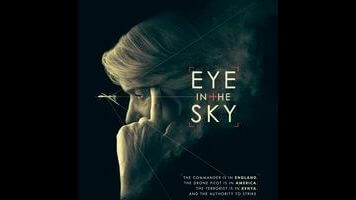“In war, truth is the first casualty,” Aeschylus assures us on the opening crawl of Eye In The Sky. The nudging placement of this Classics-seminar quotation can’t help but feel pretentious, but in fact there’s something authentically Socratic about Gavin Hood’s new thriller. At times, the dialogue gets downright dialectical as various American and British officers and functionaries plan an air strike against a houseful of Kenyan terrorists. The grim irony at the heart of Guy Hibbert’s screenplay is that getting military-starred middle-managers to authorize a tactical strike is as grueling as any garden-variety bureaucratic sign-off.
Appropriately for a post-Zero Dark Thirty mediation on the War On Terror, Helen Mirren is in full “I’m the motherfucker” mode as long-serving U.K. Colonel Katherine Powell, whose ongoing pursuit of a radicalized British citizen has led her—and the drone-mounted American missile array she commands—to a hideout in Nairobi. Upon espying video footage that her suspect is suiting up for a suicide mission later that day, Powell decides that the best option is to blow up the safe house, arguing with pitiless resolve that any ensuing civilian casualties are justified in the prevention of future carnage. (Mirren, whose recent turn in Trumbo may have been her worst ever work, inhabits the character’s righteousness without making her overtly villainous).
Hesitation, meanwhile, emanates from the locked-and-loaded Yankee trigger-man (Aaron Paul) whose assigned role as Powell’s lethal instrument doesn’t brook much insubordination, and also the higher-ups who are worried that images of the attacks could go viral. (The only collateral damage they’re sweating is of the PR variety). Their boardroom ditherings, where the buck keeps getting passed by those charged with stopping it, are alternated with the steadily escalating situation on the ground, where locals carry on oblivious to the threat literally hanging over their heads, which Hood slickly visualizes via digitally augmented God’s-eye perspectives essaying a predatory point of view.
When Eye In The Sky premiered last fall at the Toronto International Film Festival, comparisons were made to Dr. Strangelove, but a more apt reference point might be Sidney Lumet’s more four-square Fail-Safe, which similarly weighed the pros and cons of remote bombing operations against a ticking clock scenario. The question is whether the oddly antic tone of Eye In The Sky, with its steadily escalating narrative contrivances (a girl selling bread at the edge of the blast radius might as well be a damsel tied to the train tracks) and endless double-talk—well delivered by master actors like Mirren and the late Alan Rickman as her superior officer—evinces failed melodrama or on-target Kubrickian farce. It’s possible that this confusion is actually a compliment: Like Brian De Palma’s underrated Redacted, this is a film that doesn’t want to be easily pegged, either in terms of its politics or generic allegiances. Such ambiguity is a virtue, but for all his technical facility, Hood doesn’t really have the finesse of a great, fearless satirist. He keeps all of his angles—visual and ideological—hovering nicely for nearly two hours. But he doesn’t quite stick the landing.









































